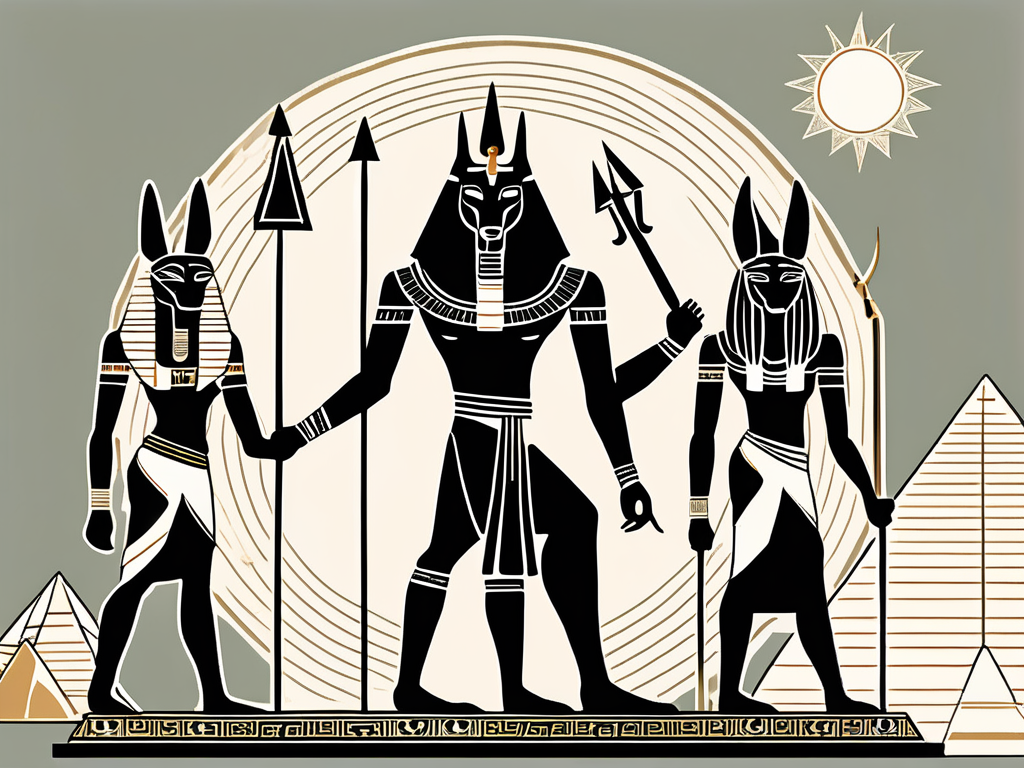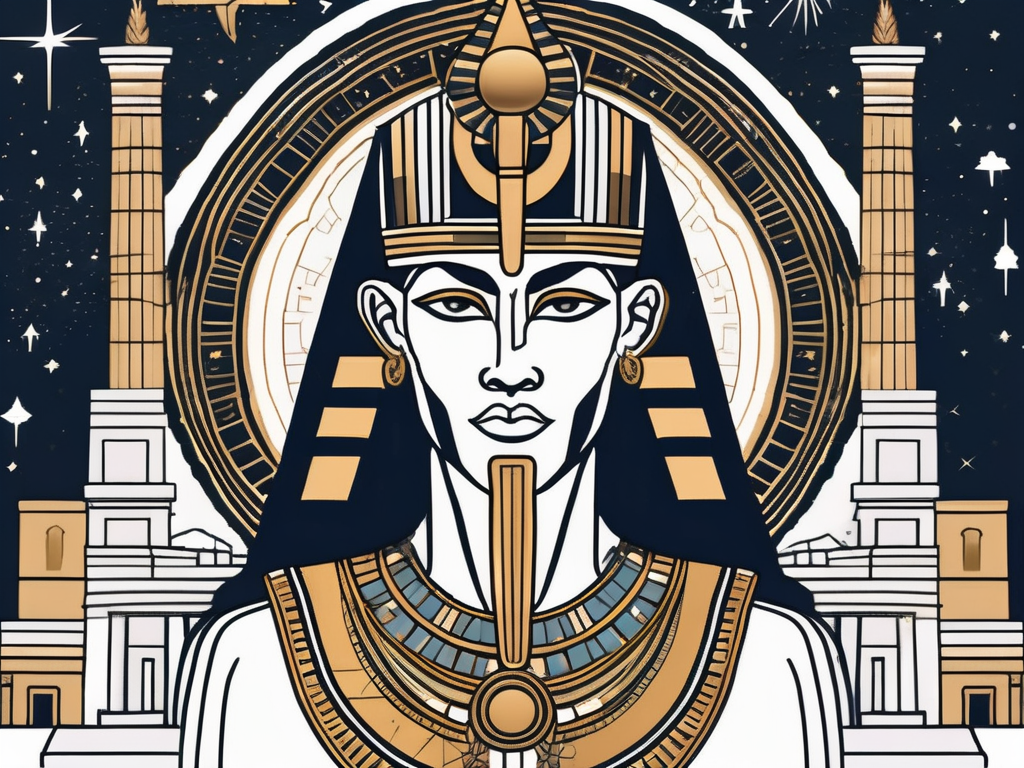Notus, the Greek god of the south wind, holds a special place in Greek mythology. With his fascinating origins and unique powers, Notus has captivated the imaginations of people throughout the ages. In this article, we will delve into the rich mythology surrounding this deity, explore his symbolism and abilities, delve into his relationships with other gods, and examine his influence on modern culture.
Understanding the Role of Notus in Greek Mythology
A key figure in Greek mythology, Notus played a significant role in the pantheon of gods. As one of the Anemoi, or wind gods, Notus was responsible for controlling the powerful south wind. The ancient Greeks believed that Notus had the ability to shape the weather and impact human activities and emotions.
Notus, also known as Auster in Roman mythology, was considered one of the four cardinal winds, along with Boreas (the north wind), Zephyrus (the west wind), and Eurus (the east wind). Each wind had its own distinct characteristics and influence on the natural world.
The south wind, which Notus governed, was associated with warmth, summer, and the scorching heat of the Mediterranean region. It was believed that when Notus blew, he brought with him the dry winds from the deserts of Africa, causing droughts and parched lands.
The Origins of Notus
The origins of Notus can be traced back to the ancient Greek creation myths. According to legends, he was born to the primordial goddess Nyx, who represented the night, and his father was Erebus, the personification of darkness. As the offspring of such powerful forces, Notus inherited a unique set of powers.
Notus was not only associated with the wind but also with the hot, sultry air that often accompanied it. This connection to heat and dryness made him a symbol of the scorching summer months, when his presence was felt most strongly.
In Greek mythology, Notus was often depicted as a young and handsome god, with a crown of flames adorning his head. His fiery nature was reflected in his personality, as he was known to be passionate and quick-tempered. It was said that when Notus was angered, he would unleash powerful storms and hurricanes, causing destruction in his wake.
Notus in Greek Literature and Art
Throughout Greek literature and art, Notus is often depicted as a strong and fierce deity. In paintings and sculptures, he is usually portrayed as a muscular figure, wearing flowing robes and carrying a staff. Notus’s presence is often accompanied by swirling winds or storm clouds, representing his control over the weather.
One of the most famous depictions of Notus can be found in the ancient Greek epic poem, “The Odyssey” by Homer. In the poem, Notus is described as a formidable force, capable of stirring up violent storms at sea. His power and influence over the wind and weather were feared by sailors and travelers alike.
Notus’s role in Greek mythology extended beyond just the weather. He was also believed to have the ability to influence human emotions and behavior. It was said that when Notus blew, he could bring about feelings of passion, desire, and even anger. This connection between the wind and human emotions made him a complex and intriguing figure in Greek mythology.
The Symbolism Associated with Notus
Notus’s role as the god of the south wind holds great symbolism in Greek mythology. The south wind, often associated with warmth and heat, represents the arrival of summer and the flourishing of nature. It is a time of abundance and growth, where life thrives under the sun’s nurturing rays.
But what exactly does the south wind, personified by Notus, symbolize? It goes beyond just the change in weather or the shift in seasons. The south wind carries with it a deeper meaning, one that resonates with the human experience. It is a symbol of transformation and renewal, a gentle reminder that change is inevitable and necessary for growth.
The South Wind and Its Significance
The gentle breeze of Notus whispers of adventure, urging us to embrace the possibilities that await us. It stirs a sense of wanderlust within our souls, reminding us that there is a vast world out there waiting to be explored. The south wind symbolizes the call to venture into the unknown, to step outside of our comfort zones and discover new horizons.
Notus, as the personification of the south wind, embodies this spirit of exploration. He encourages us to break free from the familiar and embark on a journey of self-discovery. It is through embracing change and embracing the unknown that we can truly grow and evolve as individuals.
Notus and the Season of Summer
As the god of the south wind, Notus has a strong association with the season of summer. When Notus spreads his warm breath across the land, the days become longer, and nature’s vibrant colors come to life. The arrival of summer signifies a time of joy and abundance, where the world is teeming with life and energy.
Summer is a season of celebration, a time when people come together to enjoy the bounties of nature. It is a time for picnics in the park, lazy days at the beach, and vibrant festivals that fill the air with laughter and music. Notus, with his warm and gentle breeze, sets the stage for these joyful moments, creating an atmosphere of happiness and contentment.
But summer is not just about leisure and relaxation. It is also a season of growth and productivity. Just as the south wind brings warmth and vitality to the land, it also inspires us to harness our own inner fire and pursue our passions. Notus reminds us that summer is a time to seize the day, to make the most of our time and talents, and to embrace the opportunities that come our way.
The Powers and Abilities of Notus
Notus, the Greek deity of the south wind, wields a vast array of powers and abilities, making him a formidable force in Greek mythology. His influence extends far beyond the mere control of wind, encompassing the very fabric of weather phenomena and human existence.
Legend has it that Notus possesses the power to control weather phenomena, such as storms, hurricanes, and the scorching heat of a summer day. With a mere flick of his hand, Notus can summon tempests that unleash their fury upon the earth or bring relief to parched lands, quenching their thirst with life-giving rain. His ability to manipulate the elements makes him a force to be reckoned with, as he can shape the very course of nature itself.
But Notus’s powers extend beyond the natural world; they also shape the lives of humanity. In Greek mythology, it was believed that Notus had the ability to influence human emotions, filling their hearts with passion and desire. Whether it was the fiery passion of love or the burning desire for victory, Notus could stir these emotions within mortals, driving them to great heights or leading them astray.
Sailors, in particular, sought the favor of Notus, praying for calm winds to guide their vessels and ensure safe journeys across treacherous seas. They believed that Notus could hear their pleas and grant them the wind they needed, allowing them to navigate the vast expanse of the ocean with ease. The sailors’ reliance on Notus’s benevolence highlights the immense power he held over human activities, even in the realm of seafaring.
Notus’s powers and abilities are not to be taken lightly. His control over weather phenomena and influence on human emotions make him a deity of immense significance in Greek mythology. Whether it is the raging storm or the gentle breeze, the passionate heart or the calm mind, Notus’s presence is felt in every aspect of life, reminding us of the awe-inspiring power of the natural world and the intricate connection between gods and mortals.
Notus’ Relationships with Other Greek Gods
As with any deity in Greek mythology, Notus had intricate relationships with other gods, further defining his role and significance within the pantheon of Greek deities. These relationships provide us with insights into both his character and his interactions with the divine.
Notus and the Anemoi, Gods of Wind
As a member of the Anemoi, Notus worked alongside his brothers, Boreas, Eurus, and Zephyrus, who represented the north, east, and west winds, respectively. Together, they shaped the winds that swept across the lands, playing vital roles in the natural balance of the world.
Notus’ Interaction with Sea Gods
Notus’s control over the winds made him a natural ally of the sea gods, such as Poseidon, the ruler of the oceans. Sailors and seafarers often sought the favor of both Notus and Poseidon, hoping for smooth sailing and protection from the treacherous storms that plagued the waters.
Modern Interpretations of Notus
Notus’s captivating mythology continues to inspire and influence modern culture in various ways. His character and symbolism have found their way into popular culture, leaving a lasting legacy that speaks to the enduring fascination with Greek mythology.
Notus in Popular Culture
Books, movies, and television shows often draw upon the rich tapestry of Greek mythology, and Notus has made appearances in various forms of media. Whether it’s as a character in a novel, a visual depiction in a film, or a reference in a song, Notus continues to captivate audiences with his intriguing mythology.
The Legacy of Notus in Modern Greece
In modern Greece, Notus remains a symbol of the country’s ancient heritage. His presence can be felt in the warm, Mediterranean climate and the gentle breezes that sweep across the land. By honoring Notus and embracing his symbolism, modern Greeks maintain a connection to their ancestral roots.
In conclusion, Notus, the Greek god of the south wind, holds a fascinating place within Greek mythology. From his captivating origins to his unique powers and intricate relationships with other gods, Notus continues to captivate the imagination. Whether it’s in ancient literature or modern popular culture, the legacy of Notus leaves an indelible mark on our collective consciousness.












